The Hidden Face Of Cameroon’s Dirty War
The brutal fratricidal war pitting Cameroon's soldiers and Anglophone rebels has thrown the lives of victims in a vortex of trauma, disappearances, and killings under the silent gaze of the international community.

Two peace plants sprouting on rusty-red soil are what help Morine Ngum today to locate the grave of her late husband, Calistus Nche. The grave behind their uncompleted mud house in the Mokwebu neighbourhood of Bamenda, the capital of Cameroon’s embattled North West region, is covered in small bunches of protruding grass and dried banana leaves.
Nche was shot at End-of-Tar, Longla Street, in Bamenda in 2022 while fighting soldiers of Cameroon’s Francophone-dominated government. In 2018, at 28, he gave up driving to join the Anglophone ‘struggle’.
“I didn’t want him to join the struggle, but he forcefully did after separatist fighters threatened to kill him and his entire family if he didn’t join them,” 30-year-old Ngum says, her voice breaking.
“He keeps appearing to me in a dream, crying, apologising and stating that he joined the struggle for our own sake. My last daughter, who was so attached to him, is often sick and would wake up at night shouting: ‘Daddy, please take me along with you’,” the mother of three said ruefully, referring to her six-year-old daughter. Ngum is still struggling to resume her fashion design business to make ends meet.
A few miles away, Sonita Kum mourns her 34-year-old husband, Nelson Afuh — a prison guard killed in an ambush in the remote Nso area of the region on April 12, 2022. Afuh is an Anglophone Cameroonian by birth, like Nche, but was targeted for being a member of the Cameroon military sent by Francophone President Paul Biya to quash the Anglophone secessionist revolt.
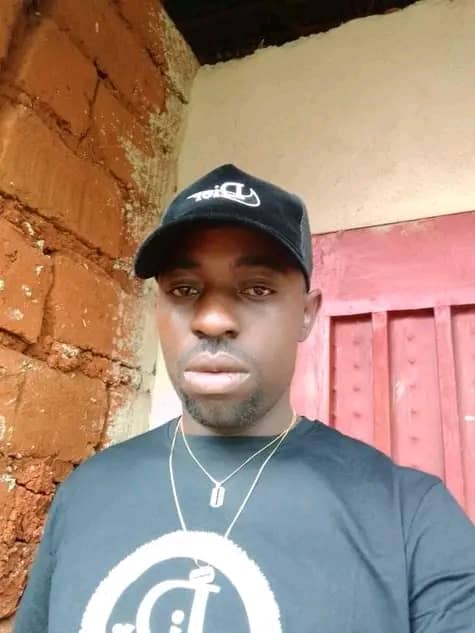
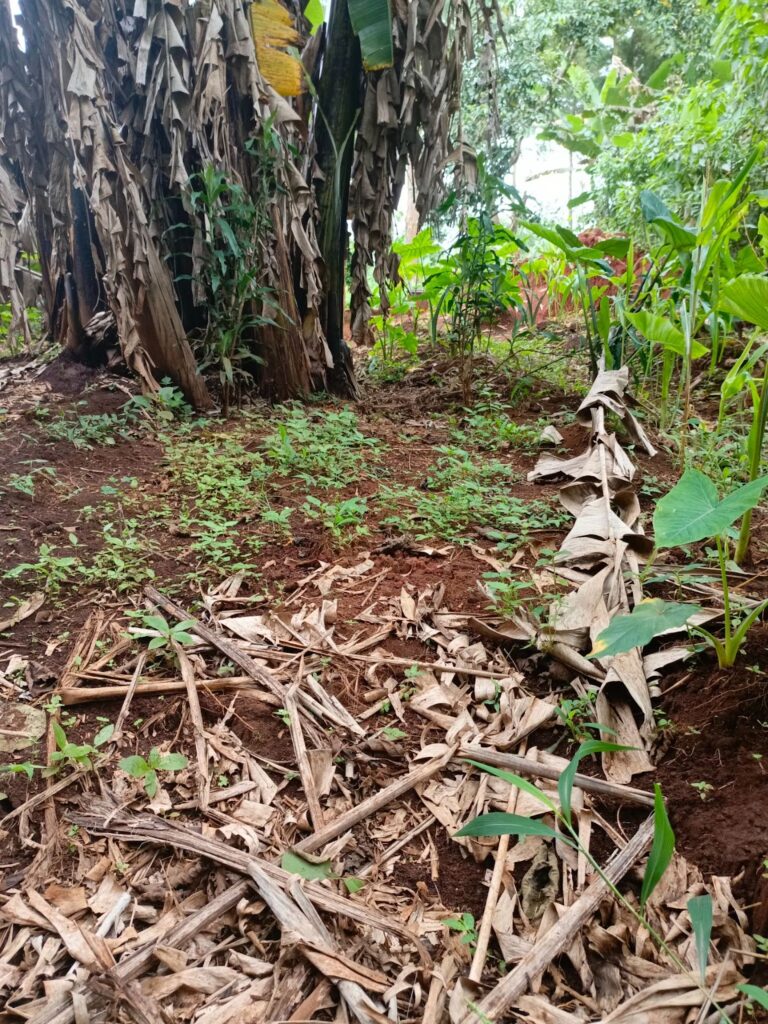
“I felt like my world had collapsed around me when my husband died,” recalls the late Afuh’s widow with bitterness in her voice. “I could barely recognise his legs in the coffin, the rest of his body having been shattered. Life is just meaningless without him,” the 34-year-old mother of three said. Notwithstanding her pain, Kum still feels her husband died for a “just” cause.
Jobless since her husband’s passing, she plans to start a business to help her take care of her kids. A spouse of another Cameroonian soldier brutally killed on August 31, 2023, in Bamenda, was too upset to speak.
Since 2016, violence has torn through Cameroon’s two Anglophone North West and South West regions after the government imposed French-speaking teachers and magistrates on Anglophone schools and courts. Peaceful protests were met with military force and the arrest and detention of the leaders.
Events then spiralled out of control, and a separatist movement emerged, calling for the independence of the territory, which Anglophone activists have styled “Ambazonia”. The war has left more than 6,000 people dead, at least a million others displaced internally, while more than 80,000 have fled to neighbouring Nigeria, according to the International Crisis Group.
Hundreds of thousands of children have been deprived of schooling as a result of the violence, especially under a school ban imposed by separatist forces who reject the education system run by the government in Yaounde, which they consider an annexation power. Meanwhile, the local economy is in free fall.
War of attrition
Notwithstanding the profound sorrow brought by the deaths of combatants like Afuh and Nche in the protracted armed conflict, others have not been discouraged from pursuing the war.
In the mountainous Menchum area of northwestern Cameroon – noted for its undulating rolling hills and open-shrubby savanna – ‘General Stone’ commands some 78 separatist fighters. Before talking to me on the phone via an intermediary, the soft-spoken rebel makes a point to inquire if I am not “one of La Republique agents” (a spy of the Cameroon government).
Still not convinced with my affirmative answer, Gen. Stone — whose name he says translates ‘invincibility’ — finally vents the spleen that prompted him to abandon farming to join the ‘struggle’: “The Francophone government has enslaved us for too long: we have many university graduates roaming the streets; people spend up to six years to obtain simple ID cards; elections are around the corner but we already know who will win… we are fighting for our rights.”
Gen. Stone said he has repeatedly turned down requests from his family to down his weapon. He expresses readiness to die a ‘martyr’ like some 30 fighters under his command. Life in the bush, Gen. Stone explains, is challenging – sometimes necessitating the use of natural herbs to treat wounds, as was the case when a bullet ripped into his toe. A new day in the bush starts with a prayer, followed by breakfast, after which a plan to target their enemies is rolled out.
“Our objective is always to kill as many Cameroonian soldiers as possible,” Gen. Stone said, not bothering to mask his intentions. “I have the means to do that. We have enough ammunition sent in from abroad. Countless numbers have already been killed. They don’t see us as humans. Likewise, we don’t see them as one.”
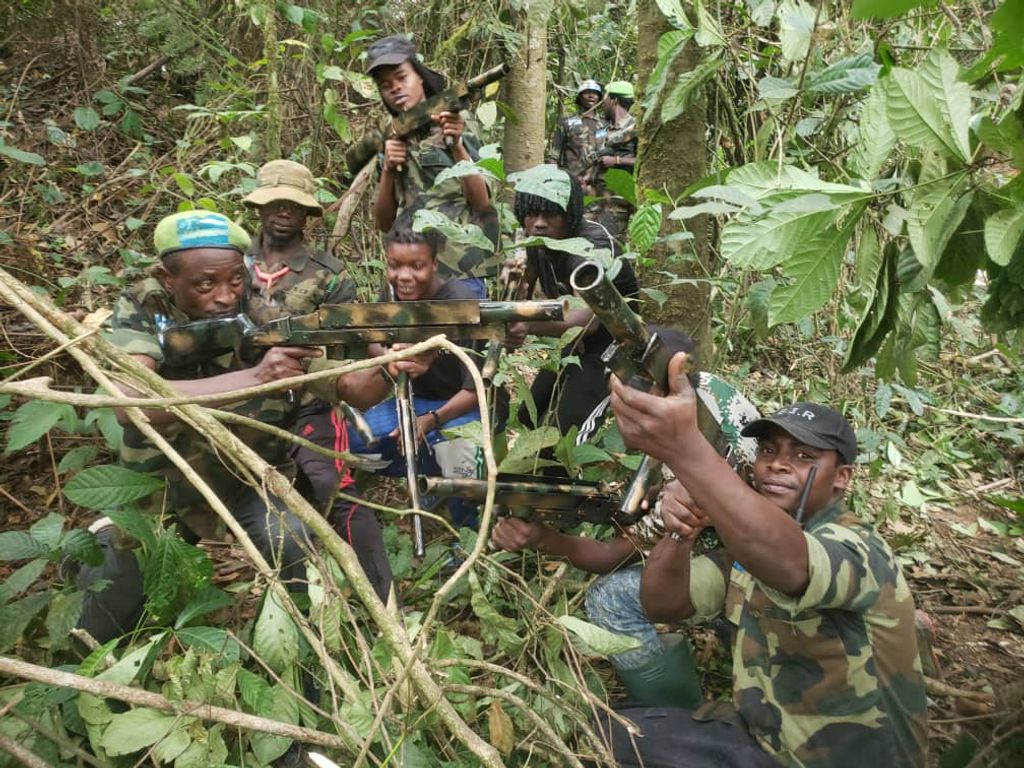
Gen. Stone is married and a father of nine. He creates time every month to commune with his children. He also claims the military “constantly” harasses his family because of his activities. “I know we will defeat them militarily one day,” he says. “Once that is done, Ambazonia will be a paradise.”
Alabukam is another separatist-prone area on the outskirts of Bamenda in northwestern Cameroon, where 27-year-old farmer-cum self-styled ‘Mission Commander’ nicknamed ‘Striker’, calls the shots.
Like ‘Gen. Stone’, ‘Commander’ Striker – claiming his name represents ‘toughness’ – justifies his rebellion on several factors: Francophones “manipulate” the brains of Anglophones; Francophones squeeze their regions “dry” economically; and Francophones deprive them of “lucrative jobs”.
‘Commander’ Striker is cagey about giving details on their modus operandi, claiming it constitutes a “military secret” that mustn’t be divulged. He also claims to have resisted calls from his family to surrender. Striker expresses willingness to die for the Anglophone cause.
“What we want is separation and nothing else,” he tells me in a telephone chat. “We trap Cameroonian soldiers with the bombs which we fabricate. Countless of them have been killed,” Striker said, nonetheless admitting a number of his peers have died in the process.
“We blocked the road in Mbengwi for two good years…We also chased the military from their base at Commercial Avenue in Bamenda. We have enough ammunition, some of which we seized from the soldiers. We will never surrender.”
While the separatist fighters feel that the balance of the eight-year war is currently tilted in their favour, Cameroonian soldiers at the war front think otherwise. One of them, speaking on condition of anonymity because he is not authorised to speak, insists the army has a “significant edge” over the separatist fighters.
The staff sergeant has fought and survived battles in Bamenda and the volatile Bamessing and Balikumbat areas in the North West region. He is an Anglophone Cameroonian who remorsefully acknowledges that he’s fighting against his brothers and sisters but maintains, “The army is there to do the job; that’s all.”
“The army enjoys the collaboration of the population to put out the separatist fighters,” the non-commissioned officer said. He confirms that the war in Cameroon’s two predominantly Anglophone regions is real, and characterised by “violence, insecurity and killings.” “The only sensible solution to this conflict is dialogue. Violence can never satisfy nor benefit either side,” he said.
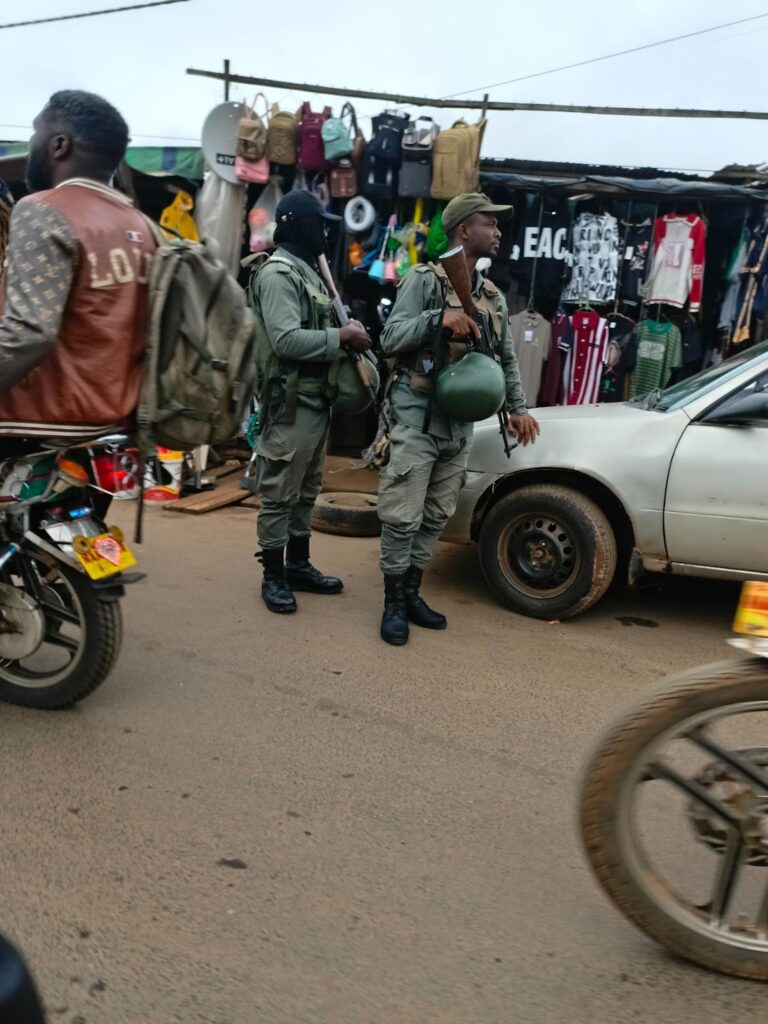
Another member of the Cameroonian military serving in the relatively peaceful Tiko area in the South West region – after fighting fierce battles in Batibo, Mamfe, Bamenda and Buea – claims government soldiers have often overpowered the separatist fighters in their many confrontations.
“The separatist fighters are poorly trained,” he says. “For us [Anglophone] soldiers, we don’t consider it a war but rather a misunderstanding between brothers. We try to make separatist fighters understand that we are one.”
He claims many separatist fighters have surrendered and considers it a sign of the military’s “overwhelming victory” in the war. “I advise them to give up fighting so that together, we can build a better Cameroon nation.”
The omnipresence of the rebels
Amid the snow-capped peaks and perfect drizzling rain of early Aug. 13, I begin my tour of the Tshuobuh neighbourhood of Bamenda. As I walk carefully among the paths of this squalid neighbourhood, two motorbikes honk past at breakneck speed, releasing trails of exhaust.
“Those are the boys [separatist fighters],” Josiah, a pseudonym I’m using for my guide, whispers. “They are just from buying cannabis. They are heading to the bush to consume it. They do that often.”
Tshuobuh has typical village settings, with a fresh breeze blowing across the many fruit trees. Later, as I sit in a shop bar waiting for a source, a six-foot-tall boyish-looking man with a goatee beard takes a seat directly opposite.
“That is a fighter,” Josiah tells me in the local dialect. The ‘soldier’, as separatist armed men are known in the local parlance here, is wearing a rocket science casual double-pocket checked shirt and a black face cap.
He wears an earring on the left ear, two black beads and a chain bracelet on his left wrist. A black earpiece, intertwining with the rope of the small brown bag he carries, hangs around his neck.
Feeling relaxed, the fighter intermittently sipped from a bottled water cooler. He sociably interjects clever remarks in the ensuing discussions. At intervals, the fighter manipulates his phone and places it back on a bible that lies on the table.
But he remains vigilant, repeatedly looking at the horizon as if on the lookout for the enemy. “They have a lot of intelligence,” Josiah tells me. “When you see them in settings like these, know that they have stationed spies in strategic locations to alert them of the army’s presence.”
Soon, two other motorbikes drive off into the heart of the neighbourhood, revving up their engines and honking multiple times. “Those are still separatist fighters heading to the bush to consume cannabis,” Josiah says.
He said the fighters move about freely in the neighbourhoods, streets, and city centre – strangely under the nose of their enemy: government soldiers. “We know them.” Locals say most youths joined the war out of frustration and desperation to flee the grinding maw of their everyday lives.
Some rent bikes intending to pay back within a specified period – usually six months. But in most cases, they fail to honour their part of the bargain due to the economic hardship in the region. They end up picking up arms and joining the ‘struggle’.
From Tshuobuh to the Bamenda city centre, shuttered shops and closed cafes remind me of the city’s once lively past. One thing appears obvious as residents hustle past each other, children running to catch up with parents when they fall behind, and birds squawking on electric power lines: everyone is suspicious of everyone else. No one seems to trust another.
Cars gallop on the potholes that have become a trademark of Bamenda – a symptom of the economic inequality Anglophone activists accuse the Yaounde regime of. But motorbikes remain the main medium of transportation.
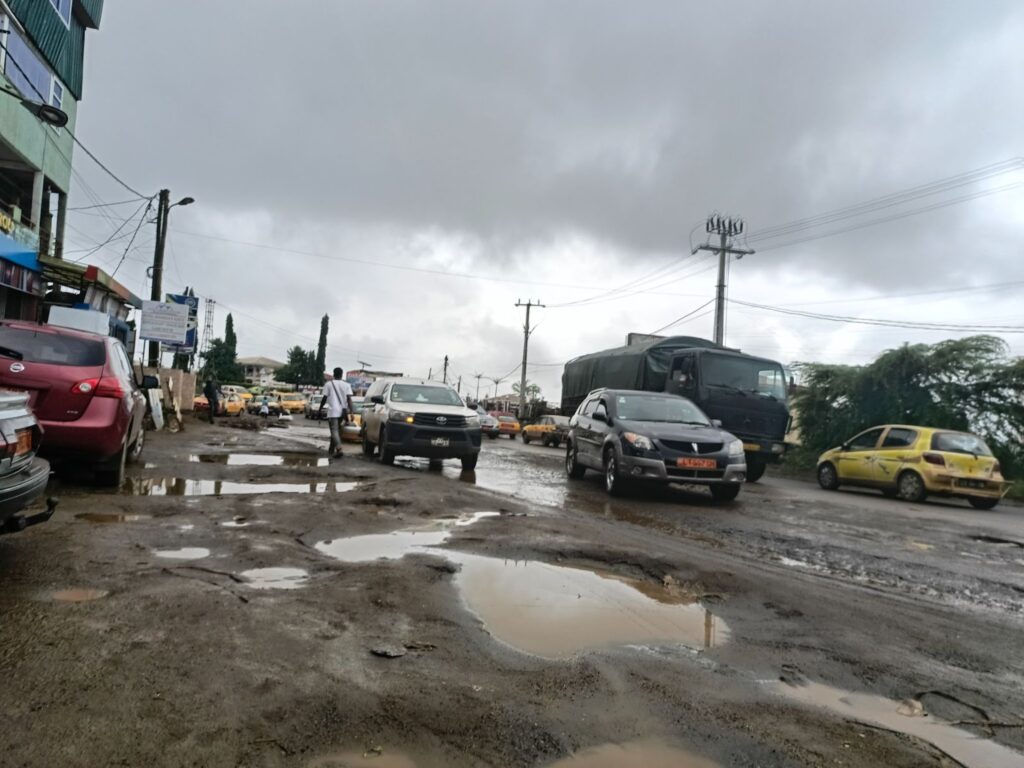
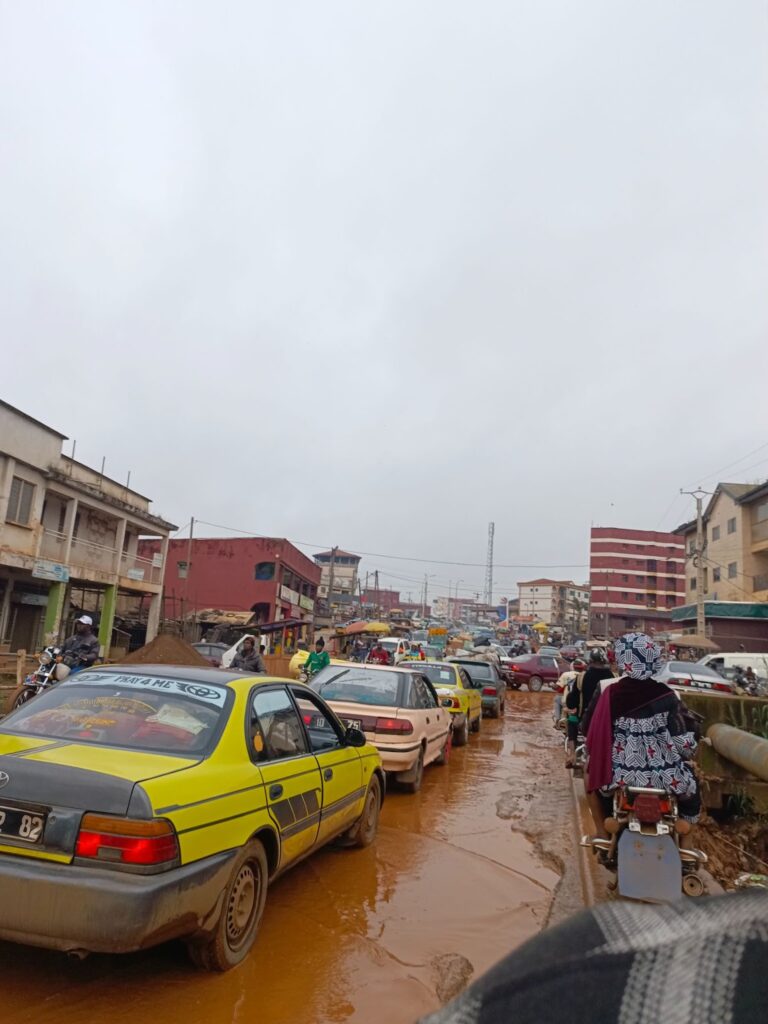
In late May, authorities imposed a dusk-to-dawn curfew on motorbikes to curb rising insecurity in the city, under the notion that motorbikes facilitate movement for armed separatists. In response, Anglophone rebels ordered cab drivers to change the colour of their vehicles from yellow to white and blue – a symbol of the flag of their secessionist revolt. Drivers who fail to comply have had their vehicles burnt down.
Conflict has colonial roots
The conflict in Cameroon’s two Anglophone regions stems from the country’s colonial past: first colonised by Germany (1884-1916), the country was later split between France and Britain after the German defeat during World War I.
French Cameroon gained independence in 1960, joined by English-speaking Cameroon through a federation a year later after a vote in a UN-organised plebiscite. The French-speaking section constitutes about 80 per cent, while the English-speaking section constitutes about 20 per cent, both in terms of territory and population. However, a controversial referendum in 1972 repealed the country’s federal structure, which guaranteed rights and secured the distinct educational, judicial, and political systems of the minority Anglophone section.
Simon Munzu, retired Chair of the Coalition of Cameroon Federalist Groups and Activists (CCFGA) Steering Committee and former United Nations Assistant Secretary-General, identifies two main factors at the origin of the present conflict.
The first, according to Munzu, is the “programmatic domination, marginalisation, assimilation, and takeover” of Anglophone Cameroon by successive Francophone-led regimes in Yaounde. “The second is the excessive concentration of governmental power, authority, and resources at the centre,” he says.
“Only federalism can address both of these root causes and pave the way to a durable peace and normalcy in all the ten regions of Cameroon. Neither a decentralised unitary state nor the breakaway of parts of Cameroon can adequately address these root causes.”
In the heat of the conflict, the government of Cameroon launched some initiatives aimed at ending the fighting. For a month in 2019, the warring parties participated in negotiations known as the Major National Dialogue. But those negotiations, which didn’t involve critical leaders of the Anglophone revolt, eventually fell apart.
Then, in September 2022, Cameroonian President Paul Biya halted a Swiss-led peace dialogue. In another effort toward ending the conflict, Canada led secret “pre-talks” to assist the two sides in initiating a formal dialogue. Anglophone leaders issued a joint statement affirming their commitment to participate in negotiations with Canada’s facilitation. But three days later, Cameroon’s government brushed aside Canada’s efforts, denying that it had asked a foreign party to resolve the conflict.
“All those measures have failed because the government is acting in bad faith,” says Munzu. “It refuses to acknowledge the exact nature of the Anglophone problem. It, therefore, refuses to adopt real solutions that could resolve the problem and end the crisis. The measures it has taken so far are purely cosmetic,” he said.
Chris W J Roberts, a political scientist at the University of Calgary, Canada, describes the Major National Dialogue as a “stage-managed” event designed more for international consumption than directed towards solving Cameroon’s long-standing, deep political problems.
Earlier in 2019, the government faced more international scrutiny and more determined non-state armed groups’ activity against security forces.
“The Major National Dialogue and the government’s earlier tacit agreement for a Swiss-led process reduced international pressure, but key factions within the Cameroon government had no intention of letting the Swiss-led process ever produce direct negotiations with those desiring an independent state,” Roberts told me in an email.
“The Cameroon government has not faced any significant international pressure to take any peace process seriously, nor did it face any consequences for embarrassing Canada and turning its back on the only good faith effort to engineer progress towards peace. That process is not completely dead, however, but since early 2023, more divisions have opened up among the multitude of Ambazonian or British Southern Cameroon groups, given the January 2023 setback,” he said.
Based on the foregoing, Roberts believes the Cameroonian government wants to hold off any serious international engagement while pursuing a “hammer-and-lies” (military force and disinformation) strategy to exhaust Anglophones rather than submit to political reform. “And each atrocity supports the government’s strategy even if [non-state armed groups] are not directly responsible,” he said.
Tit-for-tat killings
On the night of Saturday, Aug. 24, separatist fighters shot and killed three Cameroonian police officers on duty at a makeshift security post in Buea, the capital of the South West region. Earlier on Aug. 20, Cameroonian soldiers ambushed and killed a notorious separatist fighter named ‘General Robosco’ in the Menchum district of the North West region.
Tit-for-tat killings like these occur on a near-daily/weekly basis in Cameroon’s Anglophone regions. The government has intensified its pursuit of a military solution to the conflict, hoping to take advantage of widening fragmentation between the armed separatist groups, which it calls “terrorists.”
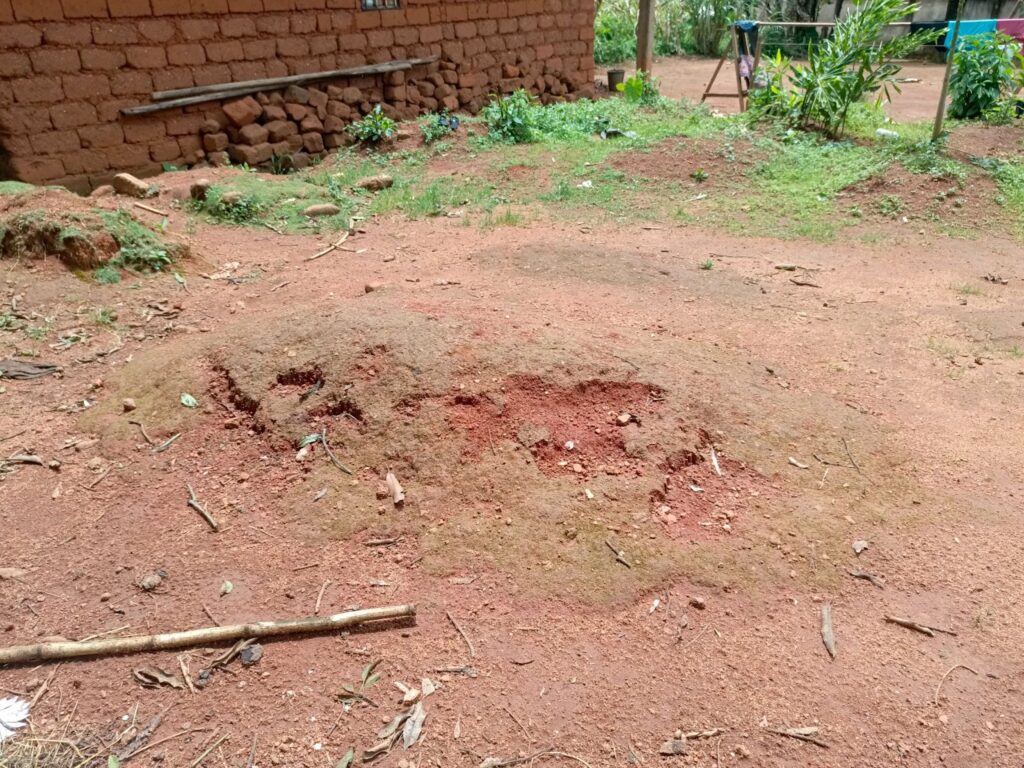
As the world’s attention ebbs and shifts towards new crises and conflicts, the Anglophone regions of Cameroon are today trapped in a vicious cycle of violence, which most often results in civilian death, injury, and trauma.
And as the conflict intensifies, so does its humanitarian toll with ideal settings for mayhem and massacre. Both Cameroon soldiers and Anglophone separatists have repeatedly been accused of engaging in village raids, massacres, unlawful killings, looting, arbitrary arrests, the use of torture, sexual violence, and arson attacks.
A group of heavily armed men suspected to be Anglophone rebels broke into a village in the Mamfe district in the South West region in the early hours of Nov. 6, 2023, killing at least 30 unarmed civilians. In June 2022, separatist fighters were again accused of masterminding the killing of at least 32 civilians during a bloody attack unleashed on the Akwaya district in the South West region.
Cameroon military and the leaders of the Ambazonia secessionist movements traded accusations following the killing of school children in 2020 and 2021 still in the region. The government later admitted the army’s role in the killing of 21 villagers on February 14, 2020, in Ngarbuh, in the North West, after initial denial – a rare occurrence in a war where cover-ups of such crimes have become common. Witnesses say the soldiers accused the villagers of sheltering separatist fighters.
Investigations into similar killings have rarely been undertaken, as crimes generally evaporate with the fog of war. Survivors of some of the massacres accuse the government in Yaounde and separatist leaders of failing to investigate civilian harm allegations, failing to prevent such damage from recurring and failing to punish or otherwise hold perpetrators accountable for injuries and deaths.
Memories of brutal killings in the ongoing war still haunt locals. Every February 14, residents of Ngarbuh in remote northwestern Cameroon converge on the tombs of the 21 civilians killed to clean the area and pray. A row of burned-out buildings blackened by soot today stands as silent testimonies of an unforgettable tragedy that befell the community.
“I weep each time I set eyes on the mass graves of the innocent people,” says 49-year-old Ma-Shey Margaret, who survived the killing but lost an uncle and his entire family. “All my neighbours were killed,” she said in a telephone chat.
“I believe those people are in heaven because they were unjustly killed. Right now, we are still not safe: the military wants us to report the presence of the separatist fighters to them, which is a risky thing to do. We live in constant fear.”
Coping with loss, trauma and disappearances
Down in Mamfe in the other Anglophone South West region where a mass killing occurred on November 6, a survivor, Franca Ojong, still grapples with loss, trauma, and unanswered questions. The mother of four vividly recollects how armed men broke into her house at around 3 a.m. that fateful day and ordered its occupants to lie down before unleashing terror.
When morning broke, all that was left of her house and over a dozen others were plumes of smoke, the ashes of the villagers’ belongings, and scores of people newly without homes.

“Before leaving, they shot my husband in the head and set the house on fire. That experience haunts me to date,” Ojong says, still transfixed by grief. She was speaking from a private missionary hospital, attending to her 12-year-old daughter undergoing treatment for malaria.
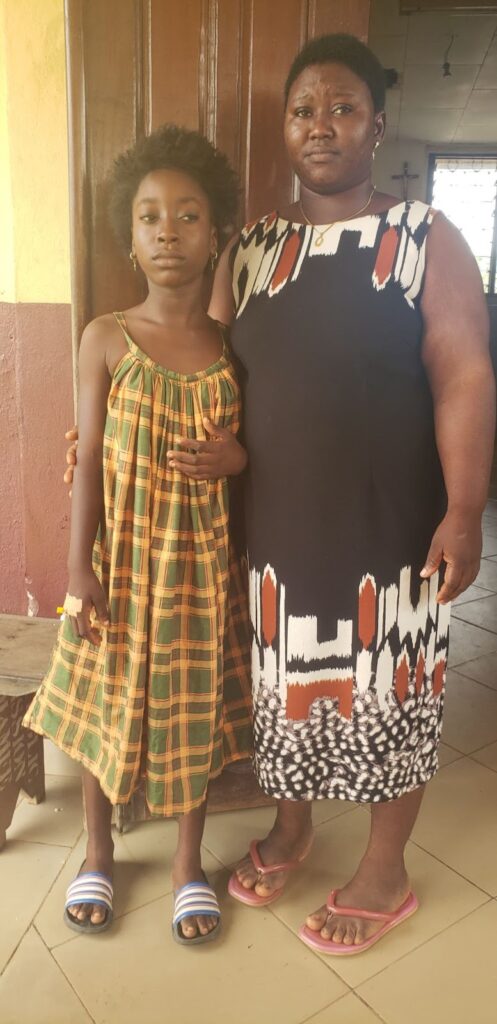
Chris W J Roberts of Calgary University said the attack on sleeping civilians in Mamfe was “not surprising” as there have been innumerable atrocities committed by both security forces and non-state armed groups given that people with guns “have long assumed a culture of impunity.”
“It appears in this case that the perpetrators are an independent non-state armed group that has been involved with localised disputes between communities over a year ago,” he said.
“At that time, those attacked fled to Mamfe and likely seemed to support security forces over separatists but for reasons related to very local land and leadership disputes. Now that same non-state armed group attacked the internally displaced in Mamfe as retribution.”
Chris W J Roberts notes that these kinds of atrocities only push civilians away from the cause that separatist fighters say they are fighting for (independence) while supporting the government’s narrative that all separatist fighters are “just thugs and terrorists.”
“We’re talking of six-plus years of war, as long now as the Second World War. War dynamics change considerably over time, so personal, community and regional conflicts can influence those dynamics as the major war aim (in this case, independence) is not attained,” he said.
The air in Mile 16, Buea, also in the South West region, is wet and musty – and punctuated by the comforting smell of cooking fires that waft up to wooden homes in the early morning of August 14. As I move further into the neighbourhood to get the stories of more victims of the ongoing war, I meet 43-year-old Florence Digha, a wiry woman with shoulder-length straight hair.
Staring blankly at the wall of her carabot house, Digha shudders as she tells how her 14-year-old son, Mendi Francis, disappeared in the heat of the crisis in 2018. She said the military framed her son – who was a motor mechanic – a separatist fighter and took him away.
His whereabouts remain unknown ever since. Neighbours familiar with the story believe that Mendi had long died in detention and that Digha simply doesn’t want to bear the thought she lost her son.
“The pain of his disappearance is unbearable,” she says. “I last saw him being paraded as a separatist fighter by the military in a video online,” Digha tells me. “I have searched for him in many detention facilities to no avail. I don’t know what to do.” Earlier in 2017, Digha’s elder brother, Digha Fidelis, not a combatant, had died from a stray bullet during a crossfire between separatist fighters and government soldiers.
From Digha’s home, my guide introduces me to that of another victim, John Tibah, a slight, haggard man who greets me feebly. Mr Tibah’s face is gaunt, while his eyes, which belie the difficult times he has gone through, are sunken in their sockets.
He describes in startling detail how his 25-year-old son, Harison Tabe, was framed as a separatist fighter by the military in 2021, arbitrarily detained and later tortured to death. This happened despite having been made to cough out nearly five million CFA francs to have his son released.
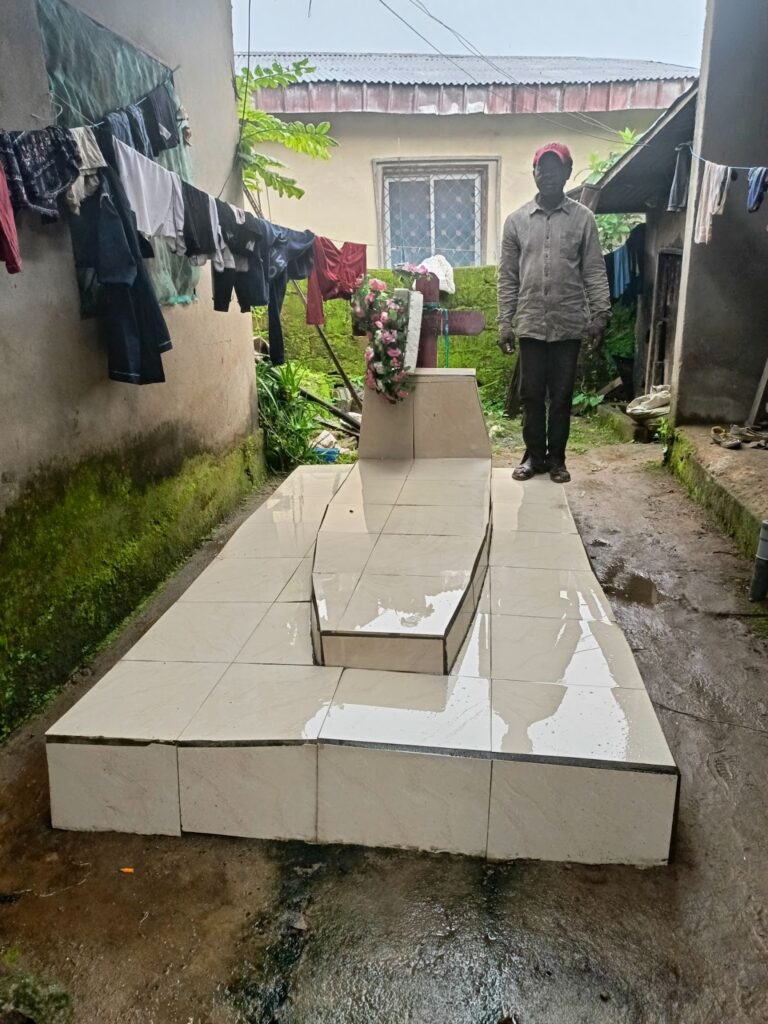
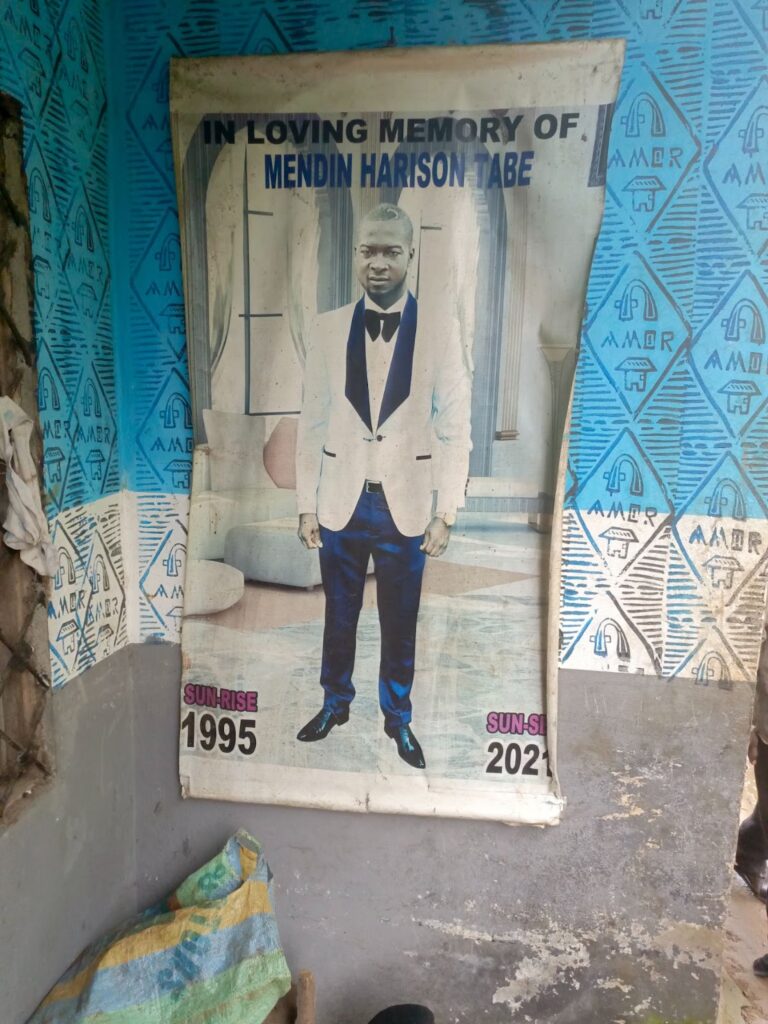
“My son’s death pains me to this day; he was the pillar of my family,” said the 57-year-old father of five as he sipped a locally brewed coffee that early morning. His son’s tragic death is far from isolated. Tibah tells me many young men who have “nothing” to do with the rebels have been arbitrarily arrested while the unfortunate ones were killed unjustly.
“The military considers every English-speaking person a separatist fighter,” Tibah says. “At times, soldiers disguise themselves in civilian attire to arrest anyone they suspect has links to the separatist fighters.”
Outfits could determine how government defence and security forces view and judge young men. “A boy was tagged a separatist fighter simply because he was not wearing a belt. The military torments rather than protects us,” Tibah recalls. Wearing belts or not seems to matter in that government forces believe separatist fighters avoid wearing them because their metallic buckles could negate their purported bulletproof mystical powers.
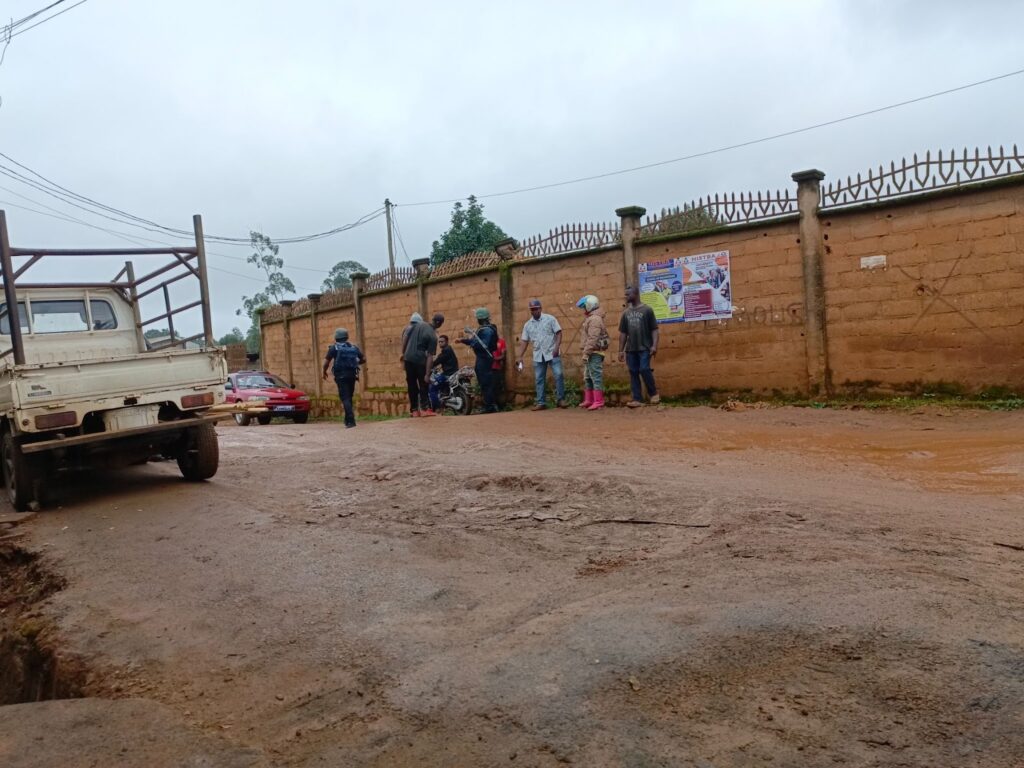
While Tibah is exasperated with the brutality of Cameroon’s military, another farmer in the North West region, Mr Ndi, feels even more so with the cruelty of separatist fighters. He sadly recalls having been forced to abandon his piggery and a five-hectare plantation because of rebels’ constant harassment and illicit taxation.
“We no longer feel safe in the land they claim to be fighting to liberate,” Ndi tells me with an unwavering grin. He pauses for a moment before continuing: “We are bound to stay indoors during Monday ghost towns, which they claim is intended to bring world attention to the conflict. But then, the fighters are guilty of violating many international laws through extrajudicial killings,” Ndi said, concluding that separatist fighters and their leaders have “defeated” the genuine purpose of the struggle.
These experiences of victims of the conflict are far from exhaustive and depict a tableau of life in war. Key details from each of their stories dovetail with one another: arbitrary detentions, extrajudicial killings, rape, torture and mysterious disappearances. Generations have been blighted by the war in Cameroon’s Anglophone regions.
Many people I approached were reluctant to speak about their ordeals owing to privacy, trauma or fear of retribution. Their private pain, hidden in shame and fear, has been concealed from the outside world. There’s general disgust among the people with a political system seemingly indifferent to the death of its citizens.
Making an omelette at the warfront
The war in Cameroon’s Anglophone regions is currently stuck in a deadly stalemate, with each of the belligerents believing it can defeat the other in battle. Separatists have been struggling to prove their control by enforcing acts of civil disobedience, such as ghost towns and masterminding kidnappings and killings. Their strategy has, to an extent, succeeded in crippling the social, economic and cultural activities of the territory and disrupting the livelihoods of the population.
However, this strategy has been met with harsh criticism even from within the cycle of secessionist leadership. Christopher Fon Achobang, the organiser of an advocacy group pushing for the peaceful recognition of the sovereignty quest of Ambazonia, known as ASPIRE MOVEMENT, attests that “bad policies” of separatist leaders have turned many away from the Ambazonian liberation war.
“Fighters who kidnap, take ransom and kill fellow Ambazonians have lost the grace and support of Ambazonians and their ancestors,” said Achobang, who resigned as Communication Council Chair of Ambazonia Governing Council, accusing its leadership of deviating from the core objectives of the struggle.
To buttress his point, Achobang cites the public execution of civilians in Guzang in the North West by fighters of the Ambazonian Defence Force, as well as the brutal killing of mayors in the same region. “These victims have friends and family who loved them. Such friends and family cannot fully embrace the struggle knowing that their loved ones would be subjected to insensitive treatment,” Achobang says. “Leaders ordering such conditions that exacerbate the suffering of Ambazonians cannot be for Ambazonia. When you claim to work for a people, you must secure their consent. You must be ready to protect their interests and work towards reaching their aspirations.”
But Chris Anu, Houston-based leader of a faction of the Interim Government of Ambazonia, dismisses these concerns, insisting it is difficult to make an omelette without breaking eggs in war situations.
“This is war, and when wars are fought, people die or are killed from both sides. What were you expecting? A bloodless war?” Anu asks rhetorically. He asserts that the ongoing war is one against “annexation, colonisation, and marginalisation.”
He goes on, “It is also about justice and liberation. Cameroon did not expect the war to linger on for eight years. In fact, if they knew what they know now, they would never have declared war. Ambazonia is holding onto its own.”
Anu insists that Anglophone freedom fighters “will not settle for anything” other than a free and independent Southern Cameroons, which is called Ambazonia. “I don’t know when the war will end, but I can say that Ambazonia will not lose,” he says.
“I ask Cameroon soldiers to stop fighting a war that ought not to be and to stop dying for nothing. I ask them to withdraw from Ambazonia because they will not defeat [us] with the barrel of the gun.”
His views are shared by Achobang, who claims Ambazonians are simply “playing the defensive” on a war forcefully imposed on them by the Cameroonian government. “It is Cameroon which declared war and set a target of two weeks to crush and neutralise Ambazonia. We are into almost 400 weeks of resisting Cameroon on our feet,” Achobang said with a sarcastic undertone.
He challenges the Cameroon government to retreat and leave Ambazonia or “face our resistance till the last man standing.”
“We have a target to continue bleeding Cameroon soldiers and destroying their war machinery,” Achobang said. “Most of their tanks have been destroyed beyond repair. Cameroon recruits about 2,000 soldiers every year. It means Ambazonia has killed thousands of these troops with many handicapped and will never return to battle. They turn around to rape, kill and burn unarmed children, women and handicapped people. Attacking vulnerable populations is a sign of defeat.” Numerous requests for comment on the state of the war from the Cameroon military high command went unanswered.
Dr Manu Lekunze, Lecturer in International Relations at the University of Aberdeen, Scotland, believes the conflict has reached a level where the government might only be able to “manage” – rather than “completely eliminate” the separatist insurgency.
“It is difficult to say who is winning the war right now, but the rebels’ ambition to create a new state looks highly unattainable,” Dr Lekunze said. “The Cameroonian military is not that powerful but is capable of dealing with the current insurgency.”
Observers attribute the apparent neglect of the protracted war to distractions from other global conflicts that harbour the interests of major powers on the one hand and the Cameroon government’s diplomacy and manipulation of the international community on the other.
While many claim that Cameroon is protected solely by France in the service of French interests, Chris W J Roberts of Calgary University insists the government has, over the years, insulated itself from international pressure given French, British, American, Chinese, Russian, Israeli, even Norwegian foreign direct investment, loans, and/or military cooperation.
Even before the outbreak of major conflict in Ethiopia (2020), Ukraine (2022), Sudan and Gaza (2023), there was minimal international concern for the escalating crisis in Cameroon since 2016-17.
“When I first started writing about it in 2018, I thought it was just because the conflict was relatively unknown, that a bit more publicity and focus would galvanise the African Union and United Nations to end the conflict and suffering,” Roberts said. “There was a brief moment of increased international focus in 2019 but, as noted previously, the Cameroon government adeptly short-circuited that concern with the Swiss-led process and the Major National Dialogue, and then Covid-19 hit in 2020.”
Roberts said the Cameroon government continued its military operations and repression while becoming eligible for emergency COVID-19 finance, which allowed more purchases of armoured vehicles and helicopters.
“Cameroon is also a logistical support base for peacekeeping in the central African sub-region. So, it is safe to say that the Biya regime has many important international partners which makes it difficult to create any sustained external pressure to nudge the government into serious negotiations of any kind,” he said. “And every time any supposed separatist group commits any atrocity – keeping in mind that overall the security forces have killed, tortured, and falsely imprisoned many more than the non-state armed group – the government leverages that in diplomatic circles to say: ‘look, we can’t negotiate with terrorists’.”
This work was produced as a result of a grant provided by the Investigative Reporting Workshop for Journalists in Cameroon project, implemented by the Cameroon Association of English-Speaking Journalists (CAMASEJ) and funded by the U.S. Embassy Yaounde.
The conflict in Cameroon’s Anglophone regions has caused immense suffering and loss, with entrenched violence since 2016. Initially sparked by the government’s imposition of French-speaking teachers and lawyers, peaceful protests escalated into a full-blown separatist movement, resulting in over 6,000 deaths and vast displacement.
Both sides, government forces and separatists, have committed atrocities, leading to daily tit-for-tat killings and severe humanitarian crises.
Efforts for peace, including the 2019 Major National Dialogue and Canada-led "pre-talks", have failed due to the government's reluctant engagement. Anglophone activists and leaders argue federalism as the true solution, but ongoing mistrust and fragmented support hinder progress.
The conflict’s deep colonial roots and the government's military stance, alongside geopolitical factors, complicate the prospects for resolution, leaving civilians caught in a tragic cycle of violence and displacement.
Support Our Journalism
There are millions of ordinary people affected by conflict in Africa whose stories are missing in the mainstream media. HumAngle is determined to tell those challenging and under-reported stories, hoping that the people impacted by these conflicts will find the safety and security they deserve.
To ensure that we continue to provide public service coverage, we have a small favour to ask you. We want you to be part of our journalistic endeavour by contributing a token to us.
Your donation will further promote a robust, free, and independent media.
Donate HereStay Closer To The Stories That Matter




